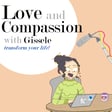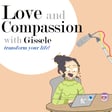
Ep.49-Conversation with Geraldine Healing the Mother
Gissele overdub: [00:00:00] hello and welcome to the Love and Compassion podcast with Gissele. We believe that love and compassion have the power to heal our lives and our world. Don’t forget to like and subscribe for more amazing content.
Gissele: on today’s podcast, we’ll be talking about treating our mother wounds. And our next guest is Geraldine Crane. She’s a serene spiritual empowerment guide. She works with women who have had toxic or difficult relationships with their mothers, helping them to stop people pleasing, stop putting themselves last, and start loving and honoring themselves.
And in doing so, have a happier, healthier relationship with those they love. She uses spiritual hypnotherapy, coaching,
and
inner child therapy to help them reconnect with their true selves and the power they have within them. Previously, Geraldine worked as a probation officer, substance [00:01:00] misuse worker, and domestic abuse recovery worker. But after realizing That her own relationship with her mother was toxic. She took that very difficult step of cutting contact with her and going on a healing journey, which led her to this work, which she feels so passionately about.
Join me in welcoming Geraldine. Hi, Geraldine.
Geraldine: Hi, thank you. I love hearing you say my stuff. It sounds so good.
Gissele: Definitely. Can you give us a little bit more about your story in terms of how you shifted from being a probation officer or substance abuse officers to the work that you’re doing now?
Geraldine: Yeah,
it’s quite a long story to be fair. It’s been quite a little while since I worked as a probation officer. That was my first kind of serious job out of, you know, finishing university and things. But. It was, as I, probation got very difficult the funding went and it was all messed around with by our government.
[00:02:00] So, I left the probation service and started working with domestic violence victims. And the reason I got really interested in that is actually, for a short period I worked in a crisis team with substance misuse. And I helped a couple of women flee from violent relationships. One particular woman was very inspiring.
She was Bengali, didn’t speak English. Her husband was using substances had been thrown out by his family. We’d got him accommodation, managed to get her into the accommodation with him because it sounded like she was being used as a slave. And when we got them out, I was really concerned about her because she didn’t speak any English.
So I got her a peer support, somebody who could speak the language and give her a bit of support. Through them, we found out it was a violent relationship and, and she was amazing, so I would go and visit her. And in front of him, she’d act all timid. The minute he was out of the room, she was like, get me out of here.
It was amazing. I just love this woman. And I [00:03:00] ended up having to hide in the back of a taxi and go and get her out and just take her to go and get support. And it was really funny that day when I finished work, I lived over the other side of London at the time, and I got on the tube, got on my train.
It takes an hour and a half for me to get home, got off my train and she comes walking down the road in the other direction with somebody from a hostel. She’d obviously been placed near to where I live and she just came running up to me and gave me the biggest hug. And it was, she just went, thank you.
She couldn’t speak much English, but she just said, thank you. And I think she was, she was the step that got me, this is what I want to do. This is where I want to be. And I’d done a lot of work in probatio

